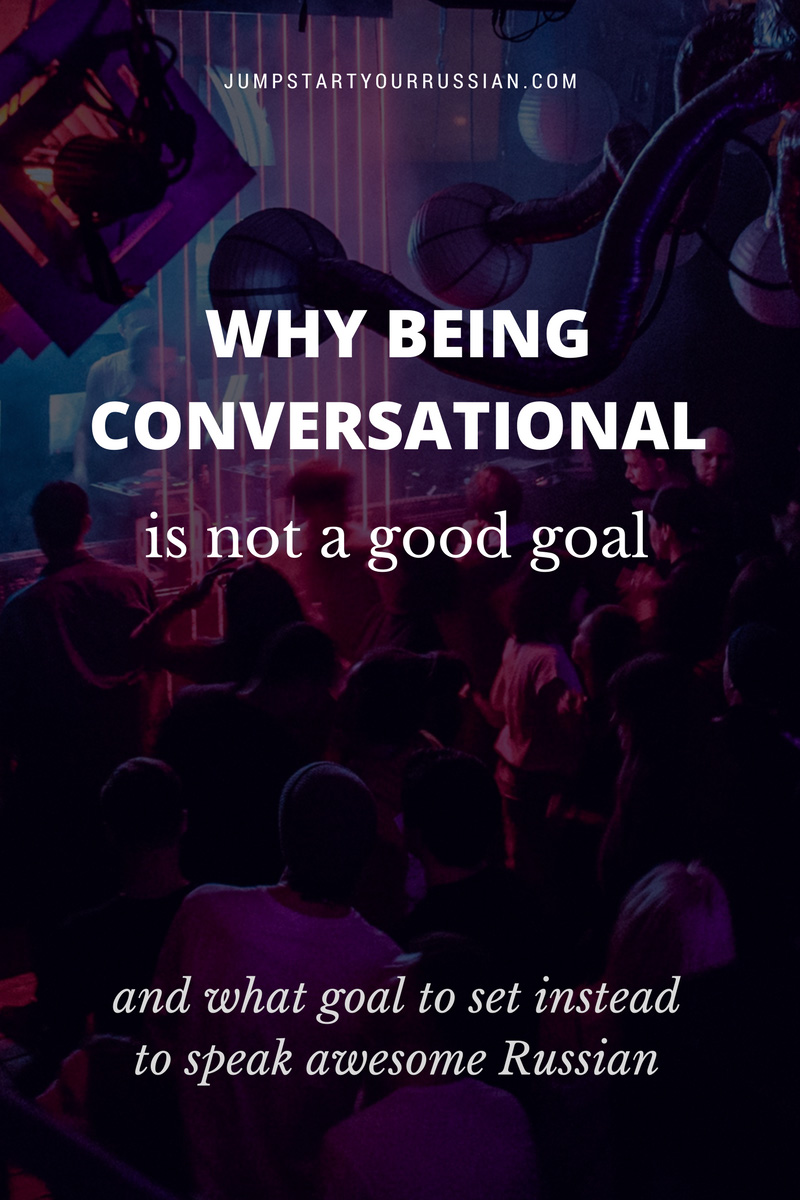
WHY BEING CONVERSATIONAL IS NOT A GOOD GOAL
In fact, it’s not a goal. It’s a dream.
Not meaning it’s impossible. But you are making it harder for yourself to reach your goal if you describe it as “conversational Russian”.
Let me explain why I think so and what you can do to make your dream a reality.
What do you mean…
- Small talk with the waiter?
- Making jokes and flirting with a girl in Russian?
- A long conversation with a traveller on the train?
- Talking about deep stuff with your native Russian speaker friends while sipping wine?
- All of the above?
The conversational levels are those words that we commonly encounter in daily conversations in an area or region; those that we may read from the newspapers, common books, hear from radios or TVs. They are not like those that are exclusives to the fields of knowledge like, legal English, technical, medical, theological lexicons, etc.
Doing small talk and having deep conversations requires different proficiency levels in Russian.
That’s why the term “conversational Russian” is vague and subjective.
So what?
- the scope of the project: how much you need to learn and when it’s enough and you can stop;
- what strategy, materials and activities to choose;
- how much time it’s going to take.
Here’s what may happen if you’re not clear on your goal
Story 1
Peter decided to learn some conversational Russian. Going to a language class was the first thing that came to his mind, so that’s what he did.
Peter never thought about it deeply but… all he wanted was being able to exchange a few simple generic sentences with Russians living in his town. Mostly for fun, as an ice-breaker.
At the language class, they made him study lots of things not necessary for his humble goal. He felt it was not only useless but also hard.
Why in the world does he need to think about “nouns” and “verbs” changing their “endings”? He just wants to say “Hello” and “How is it going?” and “See you!”
Eventually, Peter ran out of motivation and gave up. Now he’s confident he can never learn a language. It has literally become a dream.
If “conversational level” means to you being able to greet someone and say “please” and “thank you”, all you need to do is pick up a few phrases.
If you want something more, read on…
Story 2
Tom, who wanted to enjoy deep conversations in Russian, decided to do a CD course. He worked through 3 levels and memorized all the phrases. The course said he reached intermediate level.
One day he had a chance to have a Skype conversation with a Russian native speaker, Marina. It was then that he realized knowing random phrases didn’t help him.
The conversation just wouldn’t flow.
It would break here and there because Tom couldn’t understand Marina’s questions. In fact, her questions were basic – for example, Marina asked Tom what the weather was like in his town. But there were no phrases for that on his CD! Tom felt lost. And disappointed.
Some other times he wanted to express his own thoughts. He tried to make sentences similar to what was on the CD but it just didn’t work out. Marina wouldn’t understand him.
He got so angry when he realized he had wasted time with the CD. He didn’t need to memorize phrases! Now he had to start from scratch and learn to make his own (comprehensible!) sentences.
Tom’s failure to set a clear goal at the beginning led to frustration and wasted time.
So…
Get clear on your goal to reach it faster
Here’s how:
1
- Who would you like to speak to?
- In what setting?
- What do you want to be able to talk about?
- What is your Russian like?
- How fluent are you?
- How accurate are you? (Is being grammatically correct or picking the right words important to you?)
- How complex and detailed are your vocabulary and sentences?
2
Compare the levels descriptions with what you’ve described in (1). What level is your ultimate goal closer to?
If you want to speak awesome Russian, from now on, describe your goal in terms of CEFR. It will sound more specific, and therefore achievable.
3
- more than just being able to get by and have a very basic small talk,
- to take part in deep conversations,
- to talk about stuff that matters to you, that inspires you,
- to connect with people on a deeper level,
→ it means you aim at minimum B1-B2.
Of course, you’ll go step by step. You’ll first learn to say easy things and your means of expression will be limited at the beginning.
But knowing your final goal defines your strategy.
So if your goal is ambitious, I’d recommend you to build a solid foundation from the beginning. Because it’s hard to discuss deep stuff in Russian if you use grammar randomly and are careless choosing your vocabulary: not only because it’s hard to listen but also because it’s hard to understand at times.
Download the Beginner Russian Grammar and Speaking Roadmap to get an idea of your first steps: what to focus on and what to expect at the beginning (and how to build that solid foundation).
LET’S RECAP
If you describe your goal as “conversational Russian”, it means you’re not clear what exactly you want to achieve. And lack of clarity leads to random actions and average results.
By specifying what “conversational Russian” means for you, you can make your dream a reality faster and with less frustration.
What is it that YOU want to achieve? Share in the comment box below!
P.S. The photo was made in Moscow, Russia by Alexander Popov.